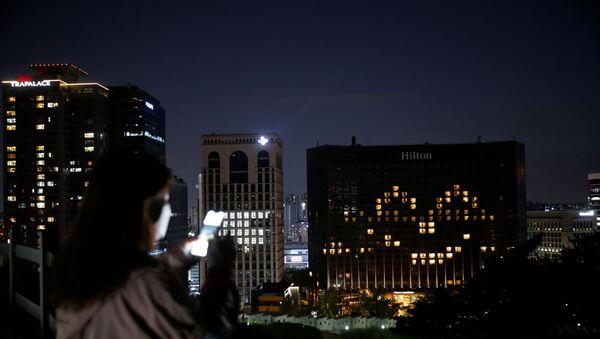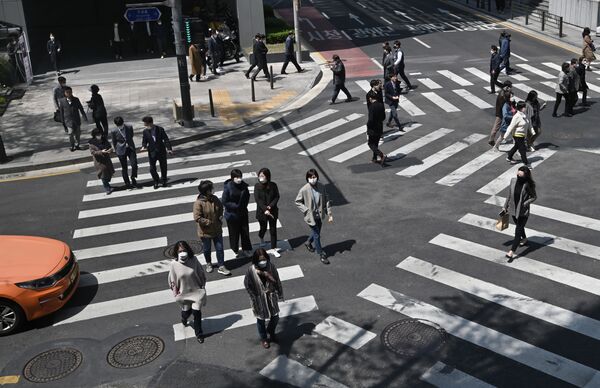The number may seem insignificant compared to other countries, but for South Korea this is a very alarming sign. If the first wave of COVID-19 covered mainly the metropolis of Daegu and its environs, today the uncontrolled infection could start in the metropolitan region, where half of the country’s population lives. If two weeks ago South Korea could boast of just two new cases per day, now there are 20-30 of them.
Sputnik has talked to some experts to find out why the country, which was a step away from victory over the coronavirus, has been thrown back and how South Korea will overcome the new challenge.
Short-Lived Restrictions
The history of COVID-19 in South Korea was initially associated with group infections. Indeed, almost half of the more than 11,000 coronavirus cases in the country have been registered among members of the Shincheonji religious group, where believers sit quite close to each other during services.
Therefore at the end of March, when most of the infected were found and put under medical supervision and the number of new cases was still fluctuating at around 100 people a day, the authorities decided to introduce an “enhanced social distancing” regime.
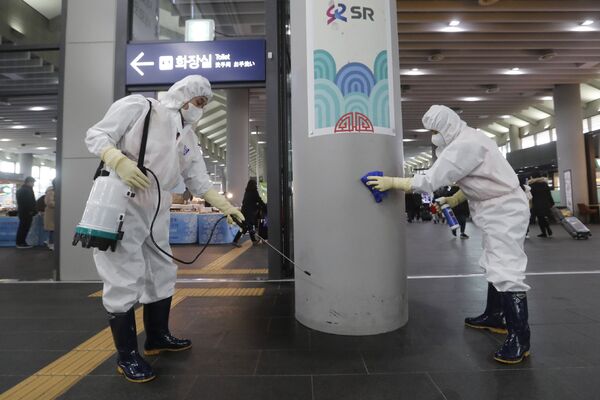
The government urged organisations whose work involves large crowds of people in small spaces to close until the situation stabilises. Those organisations that were unable to take such a step were allowed to continue operating while observing basic rules:
- measure the temperature of their employees and check them for other symptoms twice a day, keeping an appropriate journal;
- not allow visitors showing respiratory disease symptoms or those who had travelled abroad during the past two weeks – as well as people at risk;
- not allow visitors that don’t wear medical face masks;
- have hand sanitisers at the entrance and in all rooms;
- maintain a distance of at least one to two metres between people;
- disinfect the rooms at least two times a day while keeping a journal and indicating the cleaning times;
- appoint a person responsible for infection control and keeping a list of all visitors, including their names and surnames, as well as their mobile phone numbers.
However, at first all these strict innovations applied only to religious organisations, while drafting rules for additional education facilities, computer and night clubs, karaoke clubs, and other public places was left to local authorities. They were also obliged to monitor compliance with the anti-epidemic instructions and, in case of violations, issue administrative orders to close the organisation.
Seoul took this seriously and started to conduct consistent audits. The first inspections of nightclubs have shown that only a third of them were working, but even there, according to visitor logs, the number of customers has decreased by 80%, not posing a serious threat. However, less than a month later, Seoul’s mayor imposed a ban on all the remaining entertainment facilities.
The reason for this was the fact that an employee of a so-called “room salon”, where visitors privately drink alcohol in the company of young women, had been infected. Fortunately, out of more than 100 contacts, only one employee who shared a room with the first patient became infected. However, at that time, it became obvious that it was simply impossible to comply with all the rules at entertainment establishments, which by default involve close contact.
Nevertheless, the ban lasted only until 19 April; the next day, the government announced moving from “enhanced social distancing” to just social distancing. This mainly concerned national parks and other open air places; sports competitions were also allowed to be held without any spectators. The recommendations to “stop working” were replaced by a request to “refrain” from receiving visitors if possible.
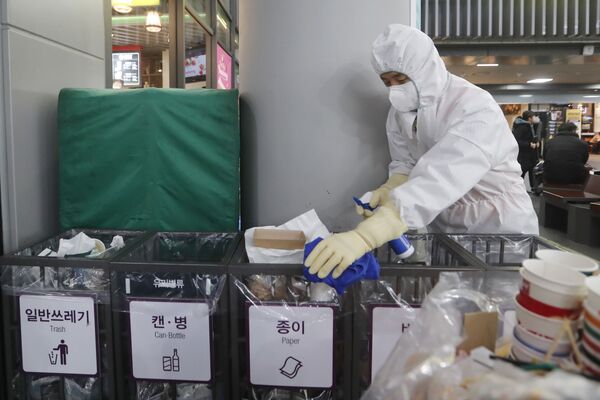
However, for nightclubs and pubs ready to resume working in compliance with the anti-epidemic measures, all restrictions remained in force, with an additional requirement to ensure social distancing in queues at the entrance.
So far, South Korea has managed to reduce the number of new cases to less than 10 per day, although initially the government set a goal of 50. This was not easy: despite the absence of strict restrictions, most people isolated on their own and are psychologically tired. Social distancing led to a 1.4% drop in GDP following the results of the first quarter. This is a lot for a country where a drop in annual GDP growth below 3% is a national tragedy.
Given that domestic consumption has decreased the most and the growth prospects through foreign markets are not visible in the context of the global pandemic, Seoul needs to revive the economy as soon as possible. Therefore, the government immediately hinted at a possible transition to “everyday anti-epidemic measures” after the May holidays. But it was these holidays that failed the South Koreans.
Here You Have Your Gangnam Style
South Korea is known as a country with some of the longest work hours per year per person. Therefore, it’s not surprising that many Koreans rested and travelled during their “golden week”, combining Buddha’s Birthday, Labour Day, the weekend, and Children’s Day.
Authorities on the resort island of Cheju even had to ask their compatriots not to come if possible, threatening to claim damages if even one new COVID-19 patient appeared in the province. As a result, the island was visited by almost 180,000 people and everything was quite calm.
On 6 May, as was promised, the government finally lifted the restrictive measures, giving everyone permission to work, while observing the previously established instructions. However, on the same day it became known that a 29-year-old resident of Yongin, which is several tens of kilometers south of Seoul, had been infected.
It was soon found out that during the holidays he travelled around the country and visited dozens of restaurants; on the night of 1 May, he visited five nightclubs in the popular entertainment district of Itaewon. It was impossible to find out where he had been infected, but a couple of days later it became obvious that he had infected many people.
At first, the authorities managed to count 1,500 contacts; but then they started to expand both the timeframe and geography. As a result, 5,517 people who visited Itaewon nightclubs from 24 April to 8 May, as well as those who could have contacted them, were included in the list of suspected infections.
Among the already identified patients were a junior sergeant from cyber operations command and a number of officers from the Ministry of Defence, as well as an employee of a store in a central department store, an employee of the third largest mobile operator LG U +, a teacher at a cram school, a family member of an employee at the Financial Supervision Service, and even a doctor at the National Health Centre who helped fight the first coronavirus outbreak in Daegu.
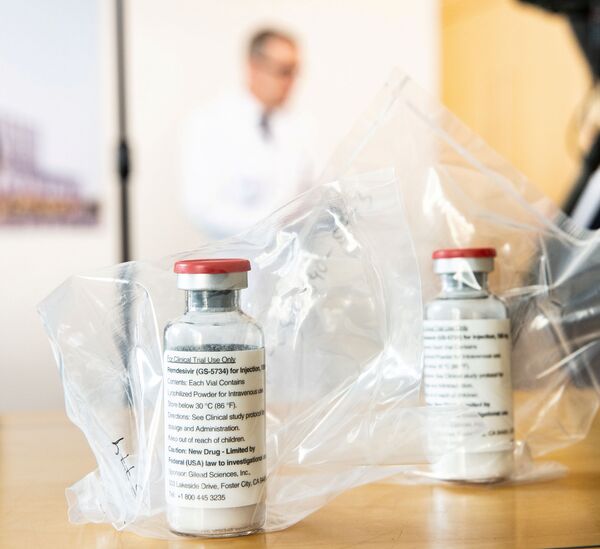
About 90 people are young, aged 19 to 29, who were in the nightclubs, while the rest were infected directly by them or through another transmission chain. Moreover, infections associated with the new outbreak have been noted in most regions of the country. What is reassuring is that 46,000 people have been tested, and there is no explosive growth in the number of patients. But the epidemiologists are still not able to reach all of the 2,500 people who visited the nightclubs, even having looked at the history of their credit card transactions. The police have already shared mobile phone geolocation data with specialists; in the near future, the remaining data will be handed over. But whether it will be possible to quickly identify and test everyone remains to be seen.
The essence of the situation is that three out of five clubs visited by the Yongin patient are popular with sexual minorities. One of those infected also visited a place known as a gay sauna. In this regard, the authorities have already guaranteed that testing will be anonymously, promising minimum disclosure of any information about movements so that a person cannot be identified. Nevertheless, not everyone trusts the government, and there might be many reasons to hide. One student, who worked as a tutor, didn’t dare to immediately talk about his visit to Itaewon, because he was afraid that it could affect his studies and subsequent employment.
In addition, inspections of nightclubs have not only revealed the non-observance of social distancing as well as people not wearing masks, but also a lack of proper control over keeping visitor logs. In fact, few people check the accuracy of the contact information, and sometimes people enter clubs without being recorded. Moreover, there are foreigners among them, with whom it may be hard to get in touch later.
In this regard, the government instructed the Ministry of Health to develop IT solutions to check visitors to establishments where there is a high risk of infection. One of the possible options has already been tested in Gangwon-do province: after authentication on the website, a user receives a QR code, which is checked at the entrance to a club. There is no direct access to personal information; information about the visit goes directly to local authorities.
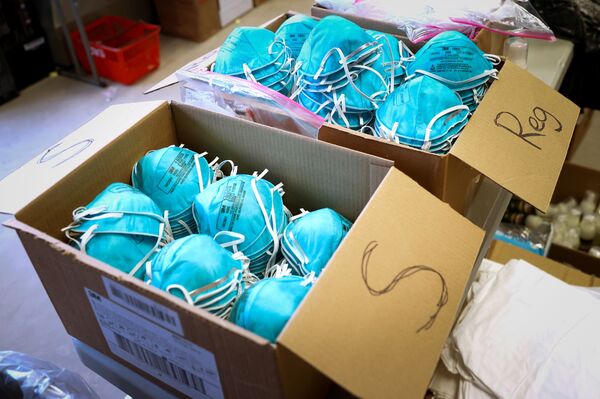
In the meantime, all entertainment facilities are closed both in the capital and in most other regions. Due to the COVID-19 outbreak in nightclubs, the start of school has already been postponed for a week, until 20 May. By then, two weeks will have passed since the end of the May holidays.
It will soon become clear how justified the longstanding fears of epidemiologists that the country has many unknown local sources of coronavirus infection are. But one thing is clear: there’s no reason to relax until there is a vaccine or an effective cure for COVID-19.
What to Do?
According to a survey conducted among Seoul residents in late April and early May, only 39.5% of respondents aged 20 to 30 considered the coronavirus situation serious. In general, the mood of residents in Seoul compared to the whole country was much more relaxed.
“In fact, although we only switched to everyday social distancing on 6 May, the discussion of the term itself as well as the detailed instructions started long before that. Under the leadership of the minister of health and social welfare, meetings of the Infectious Disease Control Committee were held; part of the discussions appeared in the media. People have already received a promise to mitigate enhanced social distancing, while nightclubs and other private institutions have half-openly resumed their work. Therefore, it can be said that the authorities providing anti-epidemic measures are partially responsible for this”, Kim Dong-heon, the chairman of the Korean Society of Epidemiology, said.
Jeong Jae-hun, a professor of preventive medicine at Kiel Hospital at the Gachon University Gil Medical Centre, agrees with him. However, he said that in the current situation, it’s hard to say how to act, since the government shouldn’t forget about the economy.
“We are witnessing an unprecedented wide spread of infectious disease; we don’t have any scientific basis for its transmission and other characteristics, so we have to find acceptable solutions through experiments. At any moment, the epidemic could start again, and we need to be extremely careful”, Jeong said.
In his opinion, the situation regarding clubs is to some extent more complicated than that with the Shincheonji cult, but using advanced information and communication technologies, as well as the quick mobilisation of all the administrative apparatus’ capacities, it should be effective in this case as well.
“I think that considering the lack of citizens’ resistance regarding legislation allowing personal data use, it will be possible to cope with this situation, using our experience in tracking infection paths using mobile phone geolocation and credit card data. But the problem is that there are foreigners and other people who don’t use mobile phones and credit cards”, the professor said.
The chairman of the Korean Society of Epidemiology is more sceptical.
“If Shincheonji believers are a group that has certain boundaries, which can be tracked through the lists of believers and visitors to religious services, clubs’ visitor logs are inaccurate, and there are many anonymous guests from all over the country. Therefore, it seems that, despite all the epidemiologists’ efforts, tracking them will be difficult. On the other hand, after reports that certain clubs are visited by sexual minorities, some visitors may hide from the authorities for fear of a forced coming-out. In order to avoid the social stigma that is still present in South Korean society regarding sexual minorities, it’s necessary to draft a plan to carefully identify them. In my opinion, it’s not coercive methods that will be effective, but those stipulating voluntariness and ensuring anonymity”, Kim Dong-Heon said.
“It seems that the next couple of days will be a critical moment, and if local distribution signs become apparent, it will be possible to raise the level of anti-epidemic measures. Despite our experience, nightclub visitors are a very active group. Therefore, our success depends on whether we can very quickly track their movement routes”, Professor Jeong concluded.

